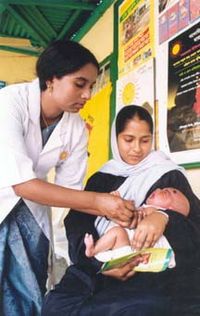
Photo from wikipedia
Background: Individual barriers can affect the provision of preconception care (PCC). The aim of the present study was to determine the rank of importance of individual barriers (care recipients) in… Click to show full abstract
Background: Individual barriers can affect the provision of preconception care (PCC). The aim of the present study was to determine the rank of importance of individual barriers (care recipients) in the provision of PCC among diabetic women from the viewpoints of care providers. Materials and Methods: The present cross-sectional study was conducted on 212 health managers, physicians, and midwives from December 2015 to March 2016. The data collection tool was a two-part researcher-made questionnaire consisting of a demographic characteristics and viewpoints scored on a five-point Likert scale (range: 0–4). Data were analyzed in Statistical Package for the Social Sciences software. Results: The mean (SD) individual barriers score of physicians, midwives, and health managers were 57.33 (15.63), 61.53 (17.81), and 54.57 (16.95), respectively (range: 0–100). A significant difference was observed between the three groups in terms of the mean score of importance of individual barriers (F = 2.54, df = 2, p = 0.040). Insufficient understanding of the importance of PCC by diabetic women and their families obtained the highest mean rank of importance in all groups. Conclusions: Although individual barriers had more importance in access to PCC by diabetic women in the view of midwives compared to the other groups, the viewpoints of the three groups were similar in most cases regarding the rank of importance of items. In order to improve the quality of PCC, the necessary measures must be taken by authorities and care providers to eliminate important barriers.
Journal Title: Iranian Journal of Nursing and Midwifery Research
Year Published: 2018
Link to full text (if available)
Share on Social Media: Sign Up to like & get
recommendations!